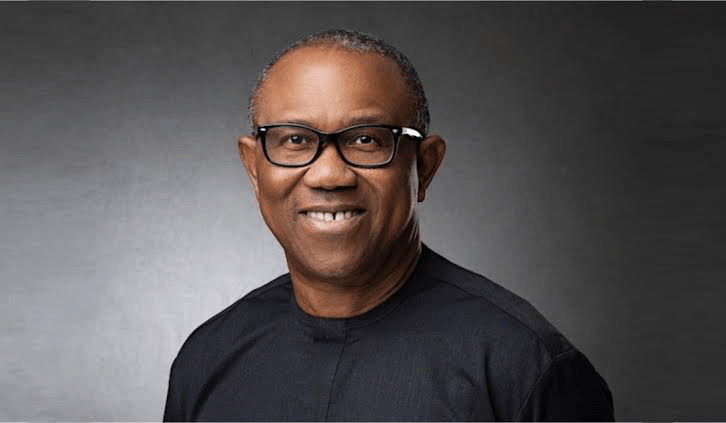Headline
Obi Disowns Photo-shopped Pictures With Simon Ekpa

The Obi-Datti Media Office has disowned a picture of the Presidential Candidate of the Labour Party, Peter Obi, purportedly taken with the Finland-based Biafran separatist, Simon Ekpa standing by his side.
Head of the Media Office, Diran Onifade, in a statement he signed in Abuja, on Thursday, dismissed the photograph which has been making the rounds on social media, as photoshopped.
He explained that desperate trolls who were hell bent on casting his principal in bad light were behind the picture and several others in their bid to tarnish his hard earned reputation.
Onifade said, “We all grew up being educated that photos tell a thousand stories and do not tell lies as photos are usually self-evident.
READ ALSO: Peter Obi Is The Chosen One, Jesus On Earth — Charly Boy
“Yet that was long years ago and long before digital technology took the World like a storm.
“That standard narrative has changed remarkably with dubious minds always ready to deploy it creatively albeit negatively, to create what is non-existent.
“Obi-Datti Media office notes that the scenario is exactly what played out in the photoshopped picture of the Presidential Candidate of the Labour Party, Peter Obi supposedly standing with the Finland-based irritant Biafra agitator, Simon Ekpa all in a desperate move to drag Obi’s name into disrepute by linking him with the ugly story that Ekpa has become in Nigeria.”
He further said, “For clarity, the picture was taken by Obi standing with an admirer on a Virgin Flight on Friday, July 21, 2023. In trying to authenticate their filthy and disgustingly dirty act, they inserted the picture of Aisha Yusuf behind them.
“The memory may be short to forget that Obi was the first to describe the sit-at-home thing as an act being engineered and bred by a criminal that the system has refused to squarely tackle.
READ ALSO: At 62, Peter Obi Is A Respectable Leader – Atiku
“Now that the menace of this crime is becoming manifest even to attract the views of the nation’s parliament, it may be necessary to critically study the handling of this crime.”
In a related development, he accused those he described as troll agents commissioned by the ruling All Progressives Congress, APC, of putting out a fake advert purporting Peter Obi as “providing 20GB Free Data and N5000 Airtime in celebration of his 62nd Birthday.”
The Obi-Datti Media Office said, “This is a SCAM! Subscriber beware!
“It is mindboggling that these criminal ploys are passed off as playing politics. Instead of seeking the line of a final solution to the cankerworm that has embarrassingly held the region and the country down, some mischief makers who are obsessed with Peter OBI’S rising fame are concerned with linking him to Ekpa.
“Yet, another failed attempt to dent the political Eagle whose concern is how to create a new Nigeria and reduce the growing poverty in the land.
“Obi-Datti Media office thinks that the reasonable thing to do if this country is sincere in tackling its socio-political and economic challenges is to quietly study the views laboriously expressed by this phenomenal political leader of contemporary Nigeria instead of trolling him endlessly.”
Headline
Russia, China Afraid Of US Under My Administration — Trump

United States President, Donald Trump, has said Russia and China fear the United States because of the strength of his administration, arguing that American global influence is driven primarily by its military power and leadership.
Trump, in a post on Truth Social on Wednesday stated that rival powers would not take NATO seriously without the United States, claiming the alliance lacks deterrent force in the absence of American involvement.
He expressed doubts about whether NATO members would come to the aid of the US in a real crisis, despite Washington’s continued commitment to the alliance.
READ ALSO:Trump To Withdraw US From 66 UN, International Organisations
The president credited his leadership with rebuilding the US military during his first term and sustaining its strength, describing this as the key reason adversaries show respect and caution toward the country.
He maintained that America’s military dominance has played a central role in preserving global stability and saving lives.
Trump also argued that his administration forced NATO members to increase defence spending, saying many allies had previously failed to meet financial commitments while relying heavily on the US.
READ ALSO:Insecurity: US Congressman Riley Moore Reveals Trump’s Mission In Nigeria
He added that his actions helped prevent further escalation in Eastern Europe and contributed to the resolution of multiple conflicts.
According to Trump, the United States remains the only nation that commands genuine fear and respect from both Russia and China, a position he attributed to his administration’s approach to defence, diplomacy, and global leadership.
“He wrote partly, “The only Nation that China and Russia fear and respect is the DJT REBUILT U.S.A. MAKE AMERICA GREAT AGAIN!!! President DJT.”
Headline
Trump To Withdraw US From 66 UN, International Organisations

United States President, Donald Trump, has announced plans to withdraw the US from 66 United Nations and international organisations, including key global bodies focused on climate change, peace and democracy.
The decision was disclosed in a presidential memorandum released by the White House on Wednesday evening, following a review of which “organizations, conventions, and treaties are contrary to the interests of the United States.”
According to Trump, the move will see the US end its participation in the affected organisations and cut all related funding.
A list shared by the White House showed that 35 of the organisations are non-UN bodies, including the Intergovernmental Panel on Climate Change (IPCC), the International Institute for Democracy and Electoral Assistance, and the International Union for Conservation of Nature.
READ ALSO:Trump’s Airstrikes: Halt Military Cooperation With US Immediately – Sheikh Gumi Tells Tinubu Govt
Although listed as a non-UN body by the White House, the IPCC is a United Nations organisation that brings together leading scientists to assess climate change evidence and provide periodic reports to guide political leaders.
The memorandum also announced the US withdrawal from 31 UN entities, including the UN Framework Convention on Climate Change (UNFCCC), the UN Democracy Fund, and the UN Population Fund (UNFPA), which focuses on maternal and child health.
Several of the targeted UN bodies are involved in protecting vulnerable groups during armed conflicts, including the UN Office of the Special Representative of the Secretary-General for Children and Armed Conflict.
Reacting to the announcement, UN spokesperson Stephane Dujarric said in a note to correspondents on Wednesday evening that the organisation expected to issue a response by Thursday morning.
Despite repeatedly stating his desire to limit US involvement in UN forums, Trump has continued to exert influence on international decision-making.
READ ALSO:Trump Using FBI To ‘Intimidate’ Congress, US Lawmakers Cry Out
In October last year, he threatened to impose sanctions on diplomats who formally adopted a levy on polluting shipping fuels that had already been agreed to at an earlier meeting, a move that stalled the deal for 12 months.
The Trump administration also sanctioned UN special rapporteur Francesca Albanese after she released a report detailing the role of international and US companies in Israel’s genocidal war on Gaza.
During his first term in 2017, Trump similarly threatened to cut aid to countries that supported a draft UN resolution condemning the US decision to recognise Jerusalem as Israel’s capital.
As a permanent member of the UN Security Council, the US wields significant influence at the United Nations, including veto power, which it has repeatedly used to block efforts to end Israel’s war on Gaza before later mediating a ceasefire.
(Aljazeera)
Headline
UK Supported US Mission To Seize Russian-flagged Oil Tanker – Defense Ministry

The British Ministry of Defence said on Wednesday that it provided support to the United States in its operation to seize a Russian-flagged oil tanker in the North Atlantic.
US seized the tanker, which was being shadowed by a Russian submarine on Wednesday, after pursuing it for more than two weeks across the Atlantic as part of Washington’s efforts to block Venezuelan oil exports.
According to Britain, its armed forces gave pre-planned operational support, including basing following a US request for assistance.
READ ALSO:UK Introduces Powers To Seize Phones, SIM Cards From Illegal Migrants
The UK also said a military vessel provided support for the US forces pursuing the tanker, and the Royal Air Force provided surveillance support from the air.
Defence Secretary John Healey stated that the operation targeted a vessel with a nefarious history linked to Russian and Iranian sanctions evasion networks.
“This action formed part of global efforts to crack down on sanctions busting,” he said in a statement.
READ ALSO:Venezuelan Deportees: US Embassy Gives Reason For Reducing Visa Validity For Nigerians
According to him, the US was Britain’s closest defence and security partner.
“The depth of our defence relationship with the US is an essential part of our security, and today’s seamlessly executed operation shows just how well this works in practice,” he added.
The British government said that the Bella-1 tanker, now renamed Marinera, is sanctioned by the US under its counter-Iran sanctions,
The MoD statement said the support was provided in full compliance with international law.

 News4 days ago
News4 days agoWhat I Saw After A Lady Undressed Herself — Pastor Adeboye

 Headline4 days ago
Headline4 days agoPROPHECY: Primate Ayodele Reveals Trump’s Plot Against Tinubu

 Metro4 days ago
Metro4 days agoArmed Robbers Shot PoS Operator To Death In Edo

 Business3 days ago
Business3 days agoNNPCL Reduces Fuel Price Again

 Metro3 days ago
Metro3 days agoAAU Disowns Students Over Protest

 Metro4 days ago
Metro4 days agoJoint Task Force Kills 23 Bandits Fleeing Kano After Attacks

 Politics4 days ago
Politics4 days ago2027: Rivers APC Pledges To Follow Wike’s Instructions

 Metro3 days ago
Metro3 days agoEdo: Suspected Kidnappers Kill Victim, Hold On To Elder Brother

 Metro3 days ago
Metro3 days agoNine Soldiers Feared Dead In Borno IED Explosion

 Metro4 days ago
Metro4 days agoGunmen Demand N200m Ransom For Kidnapped Brothers In Edo






























